- Home
- Donald Hamilton
Matt Helm--The Interlopers Page 8
Matt Helm--The Interlopers Read online
Page 8
All the way up through Seattle, the freeway traffic was too heavy for me to determine whether or not I was being tailed. Even after I’d left the city limits behind, I still had enough company to make it look as if half the population of the state of Washington had decided to move up to British Columbia, but apparently most of these northbound emigrants were making for Vancouver, on the coast. When I turned off the big coastal highway and headed slantingly inland on a smaller road that crossed the Canadian border near a little town called Sumas, I had more privacy, but I decided to wait a little longer to be quite sure I was safe from observation.
The border ritual was no trouble at all. I told the man I had a sporting rifle and shotgun, and he said fine, just keep the weapons unloaded and cased while in Canada. He didn’t even ask me about sidearms as they generally do, so I didn’t have to lie about Grant Nystrom’s .357 which was chafing my hipbone. He just checked on Hank’s rabies inoculation and waved me on.
Pretty soon I was rolling eastward along a four-lane highway more or less paralleling the border. The day was bright and warm and windless, and the truck ran straight and true down the smooth pavement, like a locomotive on tracks. It’s one of the mysteries of the automotive business, how few people really appreciate the virtues of the ordinary American half-ton truck. On the highway it’ll keep up with the fastest traffic, and off the road it’ll go just about anywhere you’d care to take a jeep. Please understand, I’m talking about the real truck now, not about all the dressed-up little bastard delivery vans that are sold under sporty names to people too proud to be seen in an honest, work-horse commercial vehicle with the engine out front.
The vehicle Nystrom had bequeathed me was a fast, powerful, and rugged machine. I wouldn’t have matched it against a Ferrari on a twisty road-race circuit, but I thought it would probably run down any ordinary car on any ordinary back-country road, particularly one that was paved badly or not at all. For the sparsely populated areas of the continent toward which my mission was leading me, I couldn’t have asked for better transportation.
Since angling was still part of my act, I stopped to buy a fishing license at a tourist-bureau office set up along the highway to make such purchases convenient for visitors to the province. Afterwards, I turned north again, according to instructions, on a two-lane blacktop road leading up the Frazer River—a historic waterway, I’d been told: the ancient gateway to the interior. No single car had made the whole route behind me. Of course, somebody could have assigned me a surveillance team, two or three different cars taking turns, and probably Mr. Smith’s people were using just this technique to watch over me, since I’d detected no signs of them. As for the opposition, the people in whom we were interested, if they were going to that much trouble it meant that my cover was blown anyway and a phone call more or less wouldn’t make much difference.
I wasn’t really worrying about the whole west coast Communist spy apparat ganging up on me. What concerned me was the possibility that a single gent with a suspicious nature—say a guy named Stottman—might be running an unofficial check on my activities in the hope of catching me doing something Grant Nystrom wouldn’t, like telephoning Washington, D.C.
By now I’d taken as many precautions as the possibility would seem to merit, but just to be on the safe side, rather than be seen standing in a roadside booth, I stopped for lunch at a small-town restaurant that boasted an inside pay phone. As a final precaution, I made my report to Mac by way of our relay man in Vancouver, insuring that there’d be no incriminating record of a long-distance call across the border.
“Indeed,” Mac said when I’d finished. “Very intriguing. What do you make of the lady, Eric?”
I said, “I know what she’d like me to make of her, sir. A crackpot nymphomaniac with alcoholic tendencies complicated by an obsessive guilt complex—that’s the picture she was painting for me, stroke by careful stroke. She wants me to believe that deep down in her subconscious she knows it was she who got Grant Nystrom killed by roping him into this courier job in the first place. I’m supposed to think that her mind rejects this knowledge and instead, in self defense, blames everybody else for her lover’s death; her Communist pals—or ex-pals—and this gang of youthful interlopers that did the actual shooting. To keep from admitting her own guilt, she’s embarked on a career of vengeance against everyone else involved. At least that’s the theory I’m supposed to buy.”
“But you don’t?”
I said, “Hell, that isn’t a picture, sir, it’s a psychiatric caricature. She’s just making it up as she goes along. This girl is as phony as a ten-dollar pawnshop Stradivarius. I don’t know who she is, but I do know what she isn’t, and that’s a rich, dipso, nympho society woman who went Communist for kicks, talked her boyfriend into joining up with her, and is now overwhelmed with remorse because he wound up getting shot as a result.”
Mac said dryly, “You seem to have an attraction for interesting young women who aren’t what they seem. Don’t forget, whoever and whatever she is, this one did save your mission, and probably your life.”
“Yes, sir,” I said. “I’m keeping it in mind. Question, sir.”
“What is it?”
“She couldn’t be one of ours, could she?”
Apparently the question took Mac by surprise, because there was a rather lengthy pause. When he spoke, his voice had a stiff and offended note: “If we’d had any agents on the job who might possibly be of assistance to you, I would certainly have let you know when I briefed you, Eric.”
This, of course, meant nothing at all. If the girl was working for us, and there were good reasons for her to keep her mouth shut even with me, they were still good. And if those reasons had caused Mac to refrain from mentioning her earlier, he’d certainly lie about her now. In other words, asking the question had been just a gesture on my part; a way of establishing for future reference—if my suspicions proved correct—that I wasn’t quite as easy to fool as people seemed to think.
“Yes, sir.” I drew a long breath. “Well, what do I do about the instructions I received from the lady?”
“Instructions?”
“I mean, should I or should I not go out and earn myself some wonderful nights with Miss Meredith?” When Mac didn’t speak at once, I said irritably: “For God’s sake, sir! Do I kill them or don’t I?”
“Oh,” he said, “I see what you mean. The answer is fairly obvious, is it not? As long as they’re alive, these people are a constant threat to you. Not only are they interfering with your mission, but also, if captured by the opposition, they will undoubtedly reveal that Grant Nystrom—the real Nystrom—is dead because they shot him, and that you are therefore an impostor just as this fellow Stottman suspects.”
I said, “I thought we wanted them to suspect me. I thought, since Holz is riding shotgun on this espionage operation, we were trying to give him a motive for descending on me, breathing fire and destruction.”
“That was what we’d hoped to do, certainly,” Mac admitted. “But I think you can see that the plan must be revised in the light of your recent experiences. Apparently we can’t count on Holz coming to you. You must therefore be prepared to go to him, by continuing as Grant Nystrom. It follows that you cannot afford to have your cover compromised by anybody, and that, whatever Miss Meredith’s motives may be, her suggestion is quite sound.”
“Yes, sir,” I said. “Sound. What about the authorities? Dead bodies tend to attract attention, and I’m told the Mounties always get their man. It would be awkward if I were the man.”
“Arrangements have been made. The Canadians have a large stake in your mission. You have nothing to fear if you are reasonably discreet. Is there anything else?”
“No, sir,” I said. “Not a thing. Eric, signing off.”
Hanging up, I made a face at something on the wall of the booth, or maybe it was just in my mind. I tried to tell myself firmly that the fact that she knew how to swing a fishing rod and talk about dogs didn’t really say
much about a girl’s character, and that Pat Bellman was nothing to me but a female fink who’d tried to set me up for murder. This was perfectly true, but I found that I wasn’t particularly eager to shoot, or otherwise dispose of, any female finks.
Thinking this, I came out into the warm sunshine after lunch to see a small car—a battered red Opel two-door—carrying two men in front and a rear seat full of luggage, being driven slowly through the parking lot. It seemed about to pause behind my camper rig; then the driver spotted me emerging from the restaurant and put on speed again, swinging back onto the highway. He was a tall man I’d seen once before, leading a black dog into an animal clinic south of the border; he was Pat Bellman’s entry in the great Nystrom sweepstakes.
There was no sign of the dog among all the luggage, which was all right with me. I’d been given no instructions to destroy the poor beast, but Mac might insist on a clean sweep if he was in a bloodthirsty mood and I was fool enough to ask.
12
I’d been planning to drive straight through to the next rendezvous, on a body of water up north called Francois Lake. My intention had been to get up there early enough, by staying on the road all night, so I’d have plenty of time to look the situation over ahead of the contact, which was set for six-thirty the next evening. However, with Nystrom Number Three and his friend hanging around, it seemed advisable to take things a little more easily and maybe get some idea what the boys—not to mention the girl—had in mind.
I thought I knew what it was. The last time I’d seen the tall man, he’d had a black dog like mine conspicuously in tow. I couldn’t be absolutely sure there wasn’t an animal hidden in the rear of the Opel, but the man had also, undoubtedly, waiting somewhere, a Chevy-based camper rig similar to the one I was driving. At the scene of Nystrom’s murder, Mr. Smith’s eager operative had interfered before the murderer could dispose of Nystrom’s body and appropriate his truck, but Chevy pickups, and pickup campers, aren’t hard to come by. Bellman and Company wouldn’t have tried the impersonation without a suitable vehicle. But Nystrom Three wasn’t driving it now, even though it would have been faster and more comfortable than his present transportation.
The implication was that he’d given up his Nystrom act. That left only one Nystrom in the running: Nystrom Number Two—me. But apparently I wasn’t to be allowed to garner the fruits of victory undisturbed.
Pat Bellman hadn’t looked like a girl who gave up easily, and she was bright enough to see the obvious. If her Nystrom couldn’t get the stuff—and he’d been pretty well disqualified in Pasco—she still had a chance, if she let somebody else’s Nystrom get it for her, and then moved in and took it away from him. At least I figured that was the way her mind worked. If I was right, I was in no immediate danger. She wouldn’t act until I’d picked up all the material she wanted. But I could count on having, plenty of company on my journey northward.
After giving Hank another run, I put the rig back on the road again, watching the big truck-type rearview mirrors. Sure enough, after a few miles, the battered little Opel appeared behind me. It wasn’t much of a car—General Motors’ uninspired answer to the Volkswagen—and with over two hundred horses under the hood I could have run away and hid from it, but that wasn’t the idea. Besides, while international arrangements seemed to have been made to let me commit murder with impunity, I might not be able to get away with speeding.
I poked along deliberately, therefore, up through the spectacular canyon of the Frazer, and north across the rolling country beyond. Once out of the canyon, I didn’t find it particularly interesting driving. The scenic mountain ranges pretty well hug the coast in that part of the world. Inland it’s just forests and fields, lakes and rivers and more forests. After a few hours, one evergreen begins to look pretty much like another.
Nystrom Three kept up pretty well, considering his limited mechanical resources. It occurred to me that if he continued to come along like a good boy to a suitably lonely place—discreet, was the word Mac had used—I could get started on the secondary phase of my assignment and, incidentally, promote myself a couple of nights of bliss with Libby Meredith, one for each man in the car behind. It seemed like earning your sex the hard way. Maybe I should have checked to find out just what she was willing to pay in cash.
How the Opel had managed to pick me up was, of course, no real mystery. After all, these interlopers, whoever they might be, had managed to learn about the last rendezvous somehow. Presumably they’d found out about the next one the same way. I considered the possibility that the real Nystrom might have talked a little more than was good for him, but the precise source of the information didn’t concern me greatly. Obviously there had been a leak in Communist security somewhere, but it wasn’t my problem, at least not at the moment.
Knowing I was heading for Francois Lake, the boys in the Opel would only have had to start early, get up here in B.C. ahead of me, and pick a suitable spot to wait for me to go by. There weren’t enough good roads this far north to make my route even slightly unpredictable.
It occurred to me that others might be using the same leapfrog system for keeping tabs on me. Pat Bellman, for instance, could have buzzed up here in her little maroon pseudo-sports car and stationed herself somewhere along the road ahead to tag me if I should elude or outrun this pair. She might even have other reinforcements spotted around: a real dragnet.
And the fact that I’d seen nothing of Stottman and his Indian-faced partner didn’t necessarily mean I was through with them for good. They could also have gambled on my running a predictable course, like a circling rabbit, and headed up here to cut me off. I sincerely hoped they hadn’t. I hoped the pudgy man had given up trying to prove I was an impostor and returned to his own stamping grounds farther south. He was a pro, and I preferred not to tangle with him unless I had to.
Judging by their performance so far, the rest of them—all the bright young interlopers, alive and dead—were strictly amateurs and nothing to worry about. If I had needed evidence on this point, the clumsy tailing job being done by the characters in the Opel would have set my mind at rest. There are circumstances under which a clever agent will deliberately let a man know he’s under surveillance, but instinct and experience told me these people weren’t that clever. They were doing their best to be inconspicuous, but they hadn’t had much practice at it, and it wasn’t very good.
We passed through small communities with names like Seventy-Mile House and Hundred-Mile House, reminders of the days when every mile up this pioneering road, away from civilization, had represented a real achievement. Farther on, we came to a good-sized lake with a sandy beach, and I pulled up to the office of a motel in the nearby village and rented a large and pleasant unit complete with bath and kitchenette for six dollars, which didn’t seem exorbitant.
With Hank romping outside, happy to be free after the long ride, I carried the essential luggage, and groceries enough for breakfast, into my room. Then I whistled in the pup, closed the door, drew the blinds, and took off his collar. It was time for me to make like a real secret agent once more; I’d stalled long enough. I got the bottle of dog-vitamins Stottman had given up so reluctantly. With the point of my knife, designed for more lethal purposes, I pried the waxed cardboard liner out of the metal cap. Underneath was a small round wafer of tinfoil about the size of a dime—to be exact, two thicknesses of foil with something sealed between them, perhaps a little disk of film, perhaps not.
I was tempted to separate the layers of foil and do some snooping. What stopped me wasn’t my orders from Mr. Smith to leave everything in this line to his boys, but the possibility that the communication I held might be rigged to destroy itself somehow—perhaps by exposure to light or air—if not handled in a specified way. Besides, I’d never be able to reseal the wafer properly, and I probably couldn’t make much sense of what was inside, anyway. Weapons are our specialty; microdots and ciphers and such are out of our line.
I followed instructions, therefore, and
used the knifepoint to pry one of the big metal studs from Hank’s collar the way I’d been shown. I fitted the wafer inside, and refastened the shiny stud to the black leather collar. There were five flat studs in all, alternating with five smaller and more pointed metal decorations, perhaps designed to keep hostile dogs from chewing on Hank’s neck. If everything went according to plan—which would be a welcome change—I’d fill another receptacle tomorrow evening, leaving three to go. By this manner of reckoning, the job was barely started. It was a discouraging thought.
In the morning, I rose early, cooked myself some breakfast—I’m no great chef, but I can manage bacon and eggs—and hit the road well before daylight. No headlights followed me away from Lac La Hache, as the place was called, but by the time the sun had come up and burned the mists out of the hollows where it lay like cotton, the beat-up red car had taken up its station behind me once more. You had to say this for the boys: they might not be expert but they were persistent.
Later, I stopped for a cup of coffee and a doughnut in the good-sized town of Prince George. The road forked here, the right-hand branch leading inland to Dawson Creek and the Alaska Highway proper, while the left-hand branch led to the coast and the town of Prince Rupert, the southern terminal of the Alaska Ferry system. By taking the ferry, the less rugged traveler could bypass all but a few hundred miles of that he-man highway in smooth comfort.
I didn’t think comfort was the reason Grant Nystrom’s Communist superiors had chosen to send him by the latter route. The Alaska Highway, built in wartime, had been routed through the remote interior where it would be reasonably safe from hostile action by sea. The ferry, on the other hand, went up the coast; and the coast presumably was where most information on the Northwest Coastal System was to be found.

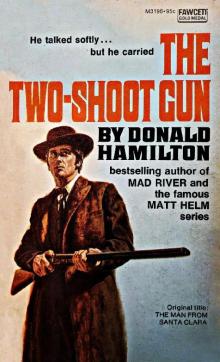 The Two-Shoot Gun
The Two-Shoot Gun Mad River
Mad River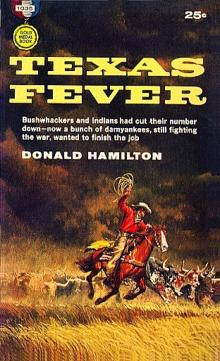 Texas Fever
Texas Fever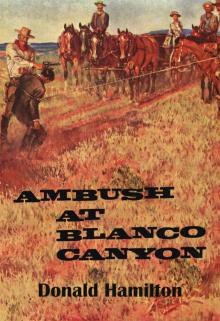 Ambush at Blanco Canyon
Ambush at Blanco Canyon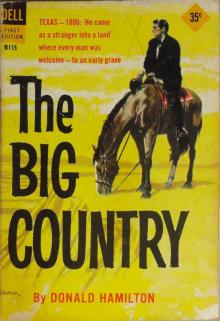 The Big Country
The Big Country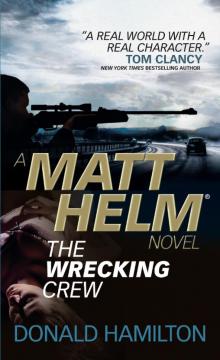 The Wrecking Crew
The Wrecking Crew The Devastators mh-9
The Devastators mh-9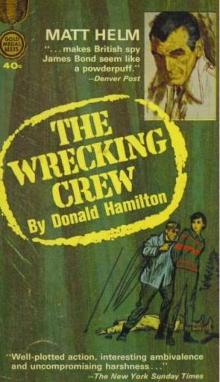 The Wrecking Crew mh-2
The Wrecking Crew mh-2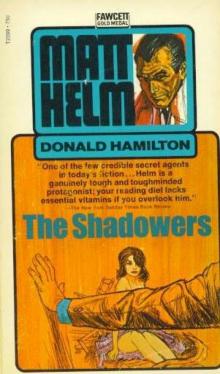 The Shadowers mh-7
The Shadowers mh-7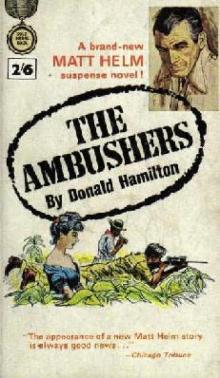 The Ambushers mh-6
The Ambushers mh-6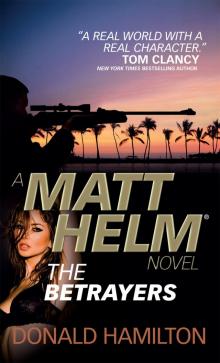 The Betrayers
The Betrayers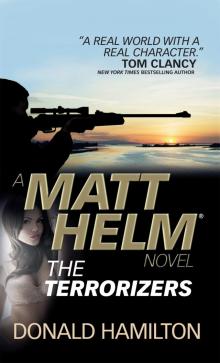 The Terrorizers
The Terrorizers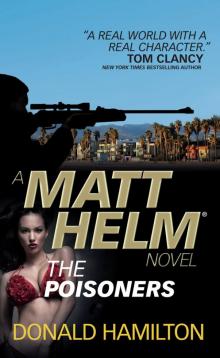 The Poisoners
The Poisoners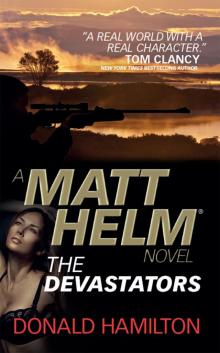 The Devastators
The Devastators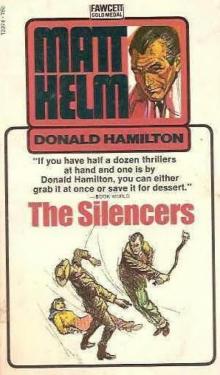 The Silencers mh-5
The Silencers mh-5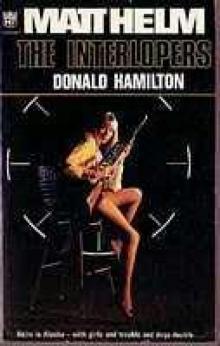 The Interlopers mh-12
The Interlopers mh-12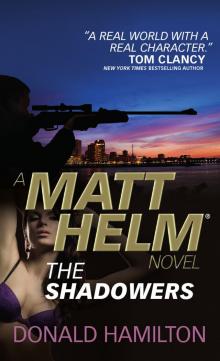 The Shadowers
The Shadowers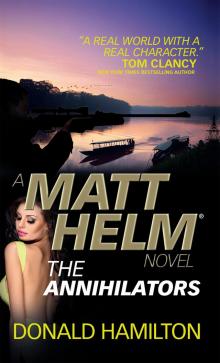 The Annihilators
The Annihilators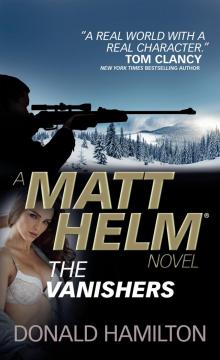 The Vanishers
The Vanishers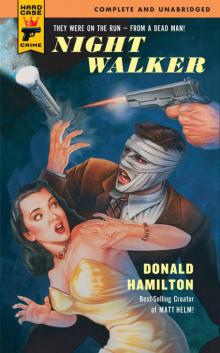 Night Walker
Night Walker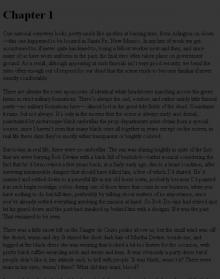 The Revengers
The Revengers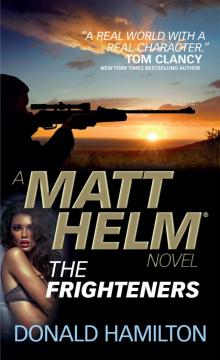 The Frighteners
The Frighteners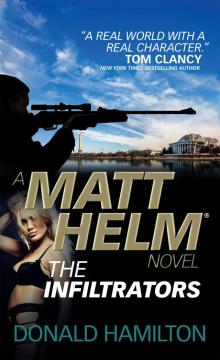 The Infiltrators
The Infiltrators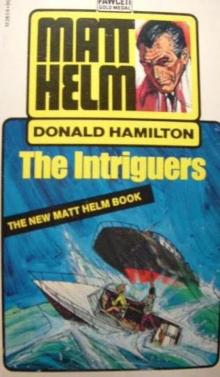 The Intriguers mh-14
The Intriguers mh-14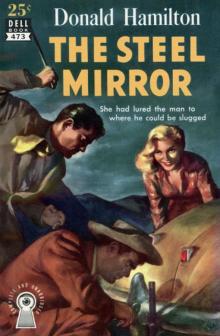 The Steel Mirror
The Steel Mirror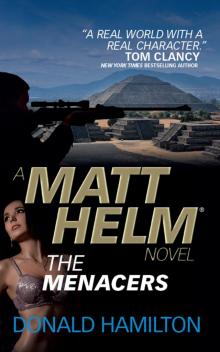 The Menacers
The Menacers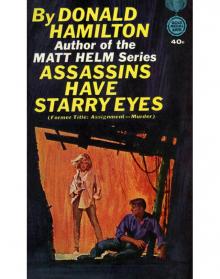 Assassins Have Starry Eyes
Assassins Have Starry Eyes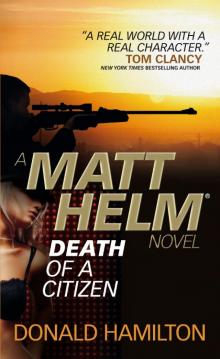 Death of a Citizen
Death of a Citizen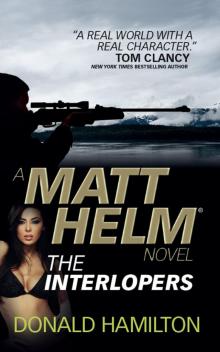 Matt Helm--The Interlopers
Matt Helm--The Interlopers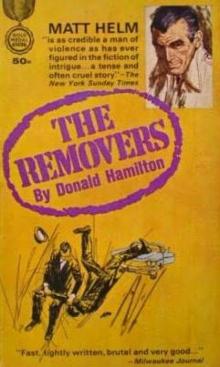 The Removers mh-3
The Removers mh-3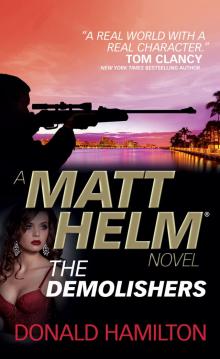 The Demolishers
The Demolishers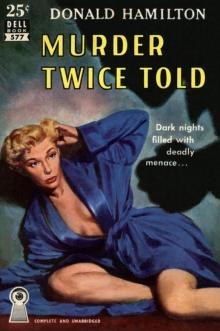 Murder Twice Told
Murder Twice Told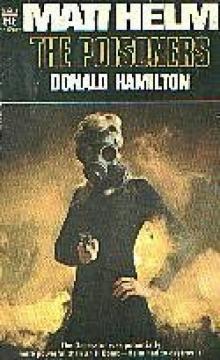 The Poisoners mh-13
The Poisoners mh-13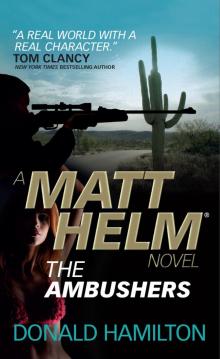 The Ambushers
The Ambushers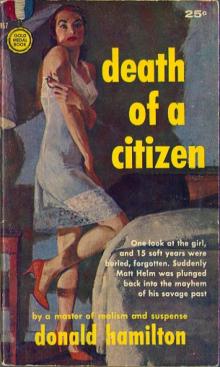 Death of a Citizen mh-1
Death of a Citizen mh-1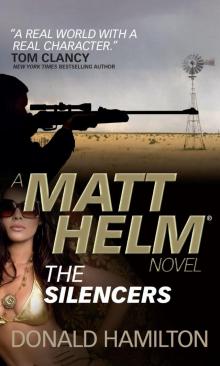 The Silencers
The Silencers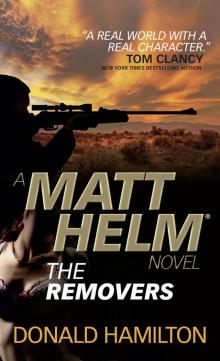 The Removers
The Removers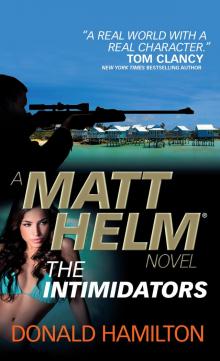 The Intimidators
The Intimidators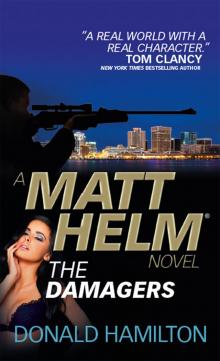 The Damagers
The Damagers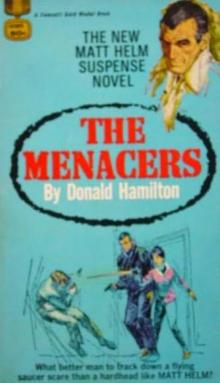 The Menacers mh-11
The Menacers mh-11 The Retaliators
The Retaliators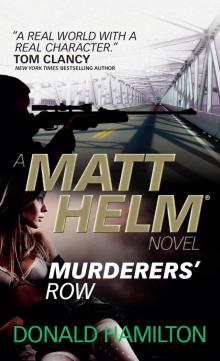 Murderers' Row
Murderers' Row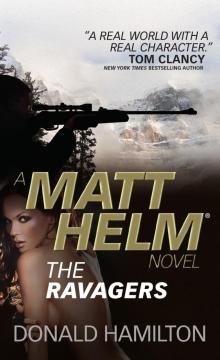 The Ravagers
The Ravagers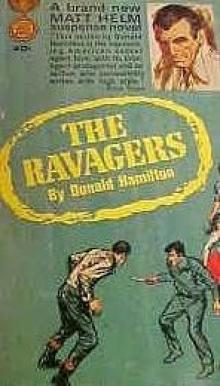 The Ravagers mh-8
The Ravagers mh-8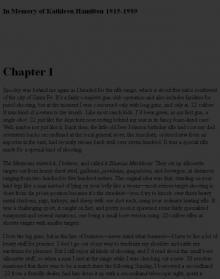 The Threateners
The Threateners The Betrayers mh-10
The Betrayers mh-10